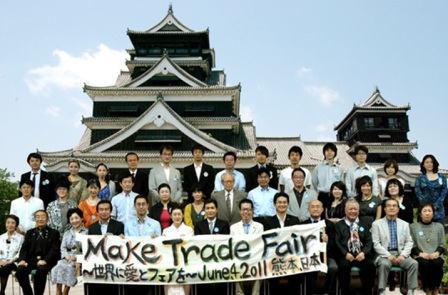Center for Fair & Alternative Trade
"Fairtrade in Japan in a Nutshell: Why and How It Is So Different" Koh Kitazawa
Presented by Koh Kitazawa, Coordinator of the Fairtrade Resource Center, Japan
On October 7, 2011, Koh Kitazawa, Coordinator of the non-profit Fairtrade Resource Center in Tokyo, Japan, presented “Fairtrade in Japan in a Nutshell: Why and How It Is So Different.”
Kitazawa’s presentation outlined the history of Japan’s Fair Trade movement then more closely examined the ongoing prospects and challenges facing Japanese growth. The concept of Fair Trade entered Japan during the 1970s via a handicraft project. In 1993, Transfair Japan (now Fairtrade Label Japan) began operating, but market growth has remained minimal. Indeed, Fair Trade labeled coffee did not enter Japan until 2002, when Starbucks Japan launched this commodity. Although Japanese Fair Trade growth remains small in comparison to Europe and the United States, the movement continues to grow. The Fair Trade Student Network (FTSN) formed in 2005, and in 2011 Kumamoto City became Japan’s first Fair Trade town, and the world’s 1000th town to receive this designation.
Kitazawa highlighted the importance of Japanese student involvement as a means of moving the movement forward. Not only are social entrepreneurs growing in popularity within young business circles, Japan is witnessing a spending shift towards conscious consumerism as consumers have begun to prioritize social and environmental responsibility. However, numerous movement challenges threaten future growth. Whereas some Japanese Fair Traders prioritize a mainstreaming approach, others view Fair Trade as a pathway toward development and, as such, are primarily focused on poverty alleviation. According to Kitazawa, while both approaches are correct, movement disputes are engendering an atmosphere of unnecessary market competition. These disagreements mirror broader movement divisions as global Fair Trade groups are engaged in heated conflict over the mainstreaming question. While the focus of Japan’s youth on social entrepreneurship may help inform Japanese Fair Trade debates, it remains to be seen how current tensions will be resolved both nationally and globally.

